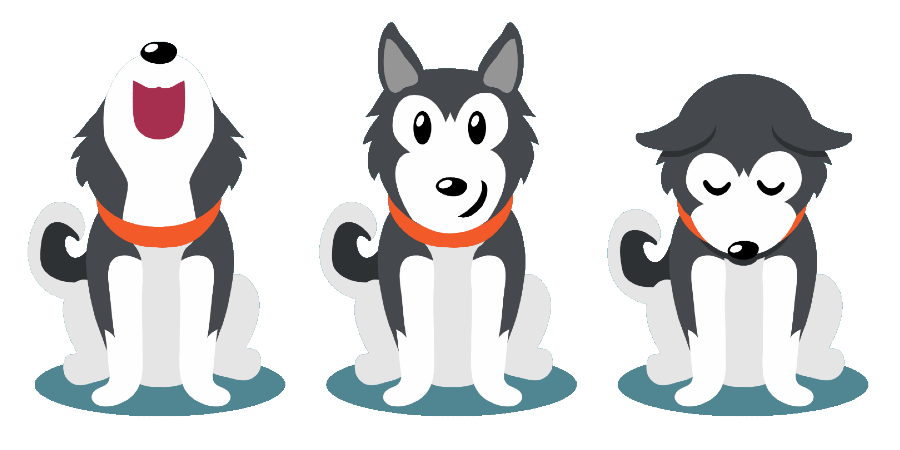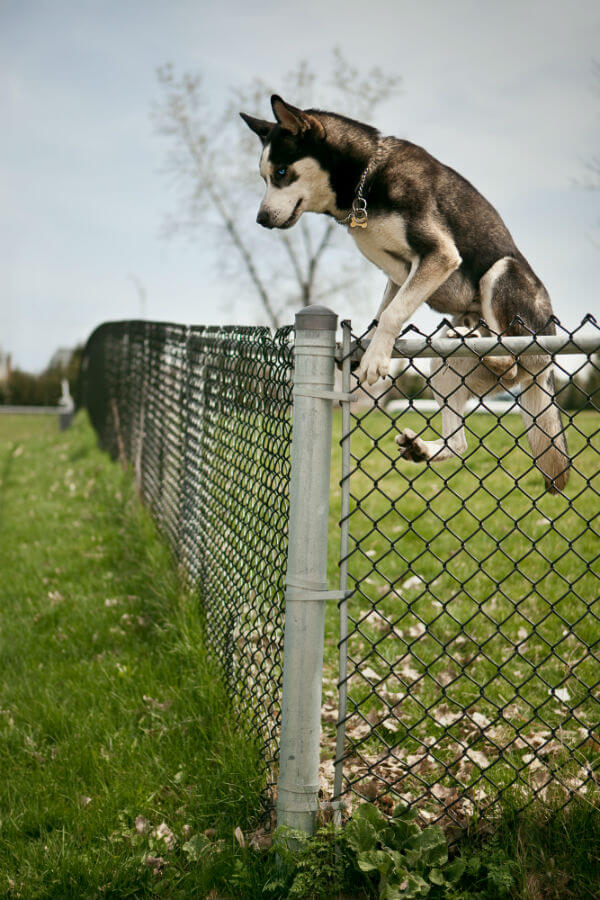Siberian Husky temperament: No, they did not use Siberian Huskies in Game of Thrones…and no, Huskies do not have the same temperament as “Direwolves”. Whatever that is supposed to be since everybody has a subjective idea about that one!
Let’s talk about real dogs.
The Siberian Husky temperament is as individual as any other dog, so don’t expect something that was churned out by a factory according to specifications. However, one can generalize about the Siberian Husky temperament since it is a pure breed and they have specific characteristics that should be present.
So, what is the Siberian Husky temperament? Siberian Huskies are bred to be working dogs rather than purely family pets or companion dogs. They do best in a pack, rather than alone. They are not guard dogs at all, so forget aspects like vicious, aggressive, attacking, dangerous, and all those bywords when dealing with a Siberian Husky. That does not mean they are timid, quiet, or boring. In fact, most Siberian Huskies will be:
- Alert
- Friendly
- Gentle
- Intelligent
- Outgoing
Sounds like a good set of traits? But there is more!
They are very, very active, very vocal and not everyone’s cup of tea. Know that having a Siberian Husky is harder work than having a baby in the house but can give as much joy (if not more, but that’s just a personal opinion). Find out more, and then think hard.

5 Siberian Husky Traits
So let’s begin with those temperamental traits that make Siberian Huskies such wonderful dogs.
If you can handle the extras that come with the package you can expect to have a companion and member of the family that is inextricably part of your life. Your friends will get tired of hearing about your dog, but you can always get new friends!
1. Alert
Look up the ten or twenty or whatever Best Guard Dogs and you will not see the Siberian Husky on the list.
This is not because he is not alert, in fact, they know what’s cookin’ all of the time. Whether there is activity inside the house, in the yard, in the street or road, and even further afield, your Husky knows about it.
Together with the alertness, goes a very deep streak of curiosity – not only does he know what’s going on, most of the time he will try to investigate.
The Siberian Husky needs a lot of stimulation, so he is always game to see, smell, and experience anything new.
Fall?
Leaves coming down from trees?
Wow! Husky wants to make its acquaintance!
Shopping?
Wow! Husky wants to see what’s in the bags!
You get the idea…
2. Friendly
Oh my, this is a blessing in disguise. Siberian Huskies love people, including children, and are always ready to make friends.

This is why it’s not a good guard dog because although it’s wakey, wakey it does not have that instinctive desire to bark and growl that good guard dogs have.
Even though they are working dogs, their friendliness means that they need to be part of the family. They must interact with everybody and be a part of any activities, even if it’s just watching TV.
They are usually friendly towards other dogs, especially other Huskies but beware of any other animals. The hunting instinct is much stronger than the guarding instinct. Stories abound of Huskies racing off after a squirrel, cat, or other small furry things without any regard for the shouting, waving human behind them!
There have been reports of Husky attacks and like any dog, a Husky will bite under given circumstances.
Canine aggression can be triggered by many different causes and it can be a complicated psychological issue with individual dogs.
3. Gentle
Is there a difference between friendly and gentle? Well, ask anybody who has been enthusiastically greeted by a big, friendly dog who does not know how to be gentle.
According to some sources, gentleness in a dog means that they know the difference between young children, puppies, small animals, adults, grown dogs, and larger animals. Some dogs, it must be said, are just plain unconcerned and could not be bothered to rouse the energy.
Siberian Huskies are not so large but they are fairly heavy (an adult male dog weighs 45 to 60 pounds or 20 to 27 kg).
A friendly Husky who is too boisterous, especially with children can be a problem. However, most of them seem to know how to behave so as not to hurt kids or puppies. We call that gentleness.
That is not the case with Siberian Huskies and small animals.
If you want a cat, rabbit, guinea pig, or something like that, better get it first, and then get the Husky. And teach the Husky (it requires patience and above all, vigilance!) that those are also part of the household, not the menu.
Good luck. 🙂
4. Intelligent

Intelligence is a difficult thing to pin down and dog intelligence even more so. The famous Coren list (published in 1994) puts the Siberian Husky at number 45.
Hmmph.
Actually, Coren has been criticized for basing his assessment of dog intelligence largely on the willingness and ability to learn and obey obedience commands.
This is known as working intelligence.
His method ignored to a large degree the other two kinds – adaptive intelligence and instinctive intelligence. To quote one respondent: “If you do everything the teacher says, does that make you more intelligent?”
One could argue that the most intelligent dog is really the least obedient one.
What, you want me to do what?
Why?
What’s in it for me?
Come to think of it, many Huskies have exactly this attitude. Is that mere disobedience? Untrainability? Or intelligent reasoning?
Intelligence in dogs (as measured by humans, remember!) also consist of traits like problem solving and adaptability. Huskies score high in both those.
They can figure out an escape route from almost any confinement, and they are able to adapt easily to new situations, such as moving house.
But are Huskies smart?
Wait, wait, surely if they are intelligent they must be smart as well? Not necessarily. We all know people who are not very intelligent but boy are they smart! It’s the same for dogs.
This is where the Siberian Husky excels. He is for example intelligent enough to recognize all those special sledding commands (Gee! Haw! Hike!) and smart enough to obey when necessary but disobey when it’s not!
Ask any Husky trainer.
Last but not least – current research being done at Harvard suggests that there are multiple types of canine intelligence. Now, that sounds like Huskies!
5. Outgoing
All of the above should give you a hint or two on whether a Husky is shy and retiring or outgoing and active. Actually, to be perfectly honest, they can be the world’s best clowns, even when they don’t try.
Siberian Huskies are very playful.
They will play with toys or interesting objects (like your throw cushions) but because they are so outgoing they prefer to play with people and with other dogs.
They are much better off with another dog as a companion so that they can play with each other, rather than with the stuff in your house or yard. The ideal is to get two puppies and let them grow up together.
Are Huskies Aggressive?
No, but don’t push them.
As the proverb says, even a mouse will turn. So if you persist in doing something to him that he does not like, he will retaliate, and you will call him aggressive.
It’s easy to recognize an aggressive dog. It behaves quite differently from other dogs. It growls, barks and snaps or bites in situations that do not warrant it.
For example, when you reach out to pat it, or when you wake it from sleep, or if you approach it while eating.
The Siberian Husky is normally the opposite of aggressive. It’s friendly, curious, playful, bursting with energy and eagerness to do things. While it is definitely a hunter, it will hunt smaller animals. It would not try to attack humans or other dogs unless there is a serious problem, which is generally due to the Husky not being exposed to contact with other humans or dogs from an early age.
There are a number of different kinds of canine aggression:
- Dominance
- Territorial
- Predatory
- Intermale
- Sibling rivalry
- Fear biting
- Idiopathic rage
Sometimes aggressive behavior may be due to medical reasons.
Pain (whatever the cause) is a very common cause of dog aggression, particularly if it is uncommon behavior for your particular dog.
Touching any place on your dog’s body where there is underlying pain will cause him to growl or snap at you. Just think of yourself – you do not want anybody touching any place on your body that is painful, but at least you can tell people what’s wrong.
Innate aggression, that is, aggression that is not dependent on external circumstances, has been bred into certain dog breeds. These dogs are the ones touted as good guard dogs, attack dogs, and personal protection dogs.
They must be trained very well to restrict their aggressive behavior to situations when it is needed. If not, you end up with a dog that will attack without any provocation, and sadly, many of them are put down. This because Man made them like that and then can not control them.
Are Huskies Dangerous?
Oh yes. They are so cute, adorable, loving, funny, friendly, and beautiful you want to take each one you see home.
But dangerous for life and limb?
No. Huskies are not dangerous. They are no more dangerous than average.
Although you may see lists of dog attack numbers, there is hardly ever an interpretation that compares it to the number of dogs of that breed.
Think about it: the German Shepherd made it onto the top three of the “most popular dogs” list in the USA since the 1950s. Is it any surprise that they also end up in the top bracket of dog bite statistics?
It would be extremely interesting if somebody made a study of the relationship between numbers of dogs and bite occurrence of a breed. Subjectively, it seems to me that there are dog breeds that almost always bite, so even if they are low in population numbers they would show up high in percentage calculations.
As for the Siberian Husky, take a good look at the statistics. How many of the “Husky-type” dogs that are listed on the dog bite statistics lists are actually purebred Siberians?
Two? Is that a lot?
There is no doubt that a Siberian Husky is heavy and strong enough to seriously injure you if it tries. Their jaws are almost as powerful as those of a Rottweiler (320 psi and 328 psi respectively). Records show that Siberian Huskies can kill, but maiming is more likely the result of a Husky attack.
Are Siberian Huskies Good Family Pets?

Are Huskies Good with Kids?
Siberian Huskies were initially incorporated into family life by the Chukchi nomadic tribe on the Siberian Peninsula. It seems logical that their ability to live along with human kids without menacing them were consciously or unconsciously selected for from the start.
This trait is still recognized as one of the characteristics of the Siberian Husky.
- Huskies like to play, kids like to play.
- Huskies like to run, kids like to run.
- Huskies and kids were made for each other!
Yes, it is a generalization and Huskies have been known to bite kids, but so have chihuahuas. There are no absolutes.
If you educate both the Siberian Husky and the child responsibly, there should not be a problem.
Babies are of course a special concern since they are so small and unable yet to understand dog behavior and dog body language. For all its gentleness you still need to supervise all interaction between the dog and the baby.
So, are Huskies good with babies?
Watch this video (and grab the tissues).
It is very important that you do not transfer all of your attention to the baby and neglect the dog. It needs confirmation that it is still a part of the family and you do not love it less because of the baby. It must never get the idea that it will only receive love and attention when the baby is NOT around.
Are Huskies Good with Cats?
Uh oh. Cats. Huskies like to hunt small animals. Cats are small animals.
Recipe for disaster.
Some owners of Siberian Huskies manage to have cats as well without any bloody incidents. But it is not the norm.
It you really want to try to teach them to live amicably together no-one can stop you, but be prepared that it may not work and you may have to bury a little body in the yard.
The final word on the Siberian Husky temperament:
Siberian Huskies are friendly, quirky, demanding, exuberant, loving, stubborn, sulky, clowning. In short, Huskies are as human as anybody else!